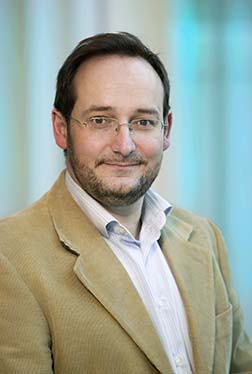Researchers at the Irish Photonic Integration Centre (IPIC), SFI Centre for Photonics at Tyndall National Institute and University College Cork (UCC) have won a combined €2.3m in funding for projects on AI energy management and integrated photonics.
The funding, revealed today, has been awarded under the Frontiers for the Future Programme announced by Minister for Further and Higher Education, Research, Innovation and Science, Patrick O’Donovan TD.
Among the successful recipients are IPIC’s Dr Emanuele Pelucchi and UCC’s Dr Barry Hayes, School of Engineering and Architecture/MaREI, the SFI Research Centre for Energy, Climate and Marine.
Dr Pelucchi has received €1.29m (€1,296,252.34) for his project, “Expanding Site-Controlled Quantum Dot Technology: Photonic Cavity Toolkit Development For Quantum Integration (Exquis)”.

Exquis leverages the incoming ‘second quantum revolution’ to address fundamental steps for the demonstration of fundamental photonic devices for quantum information processing based on semiconductor artificial atom technology and integrated photonics.
The project involves European and Irish partners who will work in synergy towards an ambitious and potentially high-gain goal.
Commenting on his award Dr Pelucchi said:
“Importantly, this award complements the range of activities in quantum computation in Tyndall and its Quantum Computer Engineering Centre (QCEC), boosting research on photonic quantum technologies.”
Professor William Scanlon, CEO, Tyndall said:
“These distinguished awards recognise Dr Pelucchi’s work in integrated quantum photonics, thus strengthening Ireland’s internationally significant position in the creation of new quantum technologies.”
Professor John Cryan, UCC Vice President for Research and Innovation said:
“Congratulations to Dr Barry Hayes and Dr Emanuele Pelucchi on receiving these prestigious awards that will enable them to deliver research focused solutions to major societal, technological, and environmental challenges. These project awards will further enhance UCC’s world leading research reputation in the areas of Sustainability, Artificial Intelligence and Quantum & Photonics, key areas of our UCC Futures Framework.”
The projects are two of 28 funding awards announced today valued at €34 million to support research across seven Higher Education Institutions.
Speaking today, Minister O’Donovan said:
“These awards support the development of world-class research in areas of science, technology, engineering and mathematics.
“The projects and higher education institutions are focusing on will help deliver solutions to some of the major challenges facing society, including in healthcare, the environment and technology.”
The 28 awards are of 4-5 years’ duration and will support 124 research positions including 58 postdoctoral positions, 53 PhD students and 13 research assistants and other positions. This programme has been funded in collaboration with SEAI.
Dr Ruth Freeman, Director, Science for Society at Science Foundation Ireland, said:
“The SFI Frontiers for the Future awards provide opportunities for independent investigators to conduct highly-innovative, original research on important questions.
“I would like to thank SEAI for collaborating on this programme with SFI, supporting vital research in the area of sustainability.”
Director of Research and Policy Insights at Sustainability Energy Authority of Ireland (SEAI), Margie McCarthy, said:
“SEAI is delighted to be a co-funding partner in the Frontiers for the Future Programme.
“These awards are excellent examples of national innovation and creativity. By supporting independent researchers, we can help grow Ireland’s national capacity to conduct excellent scientific research.
“We look forward to the new insights and knowledge that the co-funded awards will bring to offshore wind energy support structures and anaerobic digestion ecosystems, and how their results will advance Ireland’s clean energy transition.”
The research will be undertaken in the following seven research bodies: Dublin City University, Trinity College Dublin, University College Dublin, Tyndall National Institute, University College Cork, Teagasc, and University of Galway.
